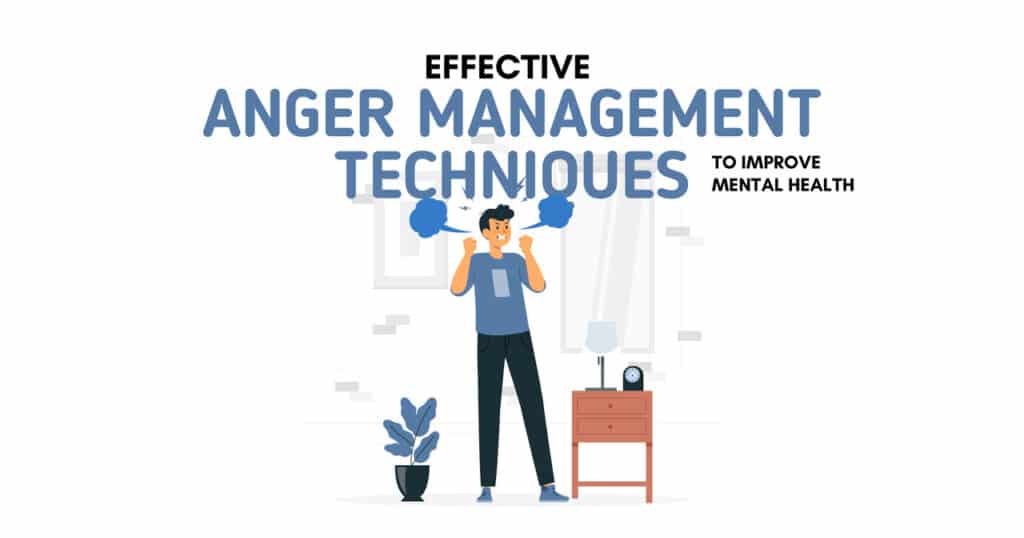It has long been proven that intense anger has an extremely negative effect on a person’s life as well as the lives of others around them. Both physical and mental health suffer when the person is constantly mad yet there are no specific reasons for it – high blood pressure, migraines, insomnia, anxiety, and depression are among the most common consequences an individual in need of anger management will experience.
And that does not include the short- and long-term impact of your anger on others – from headaches and chronic trauma to growing resentment and drifting apart, you risk harming all the people you care about and losing them forever.
We will introduce you to the importance of anger management for mental health, teach you some methods to address your anger if you suspect it adversely affects your life, and emphasize the significance of therapy for people unable to control their anger on their own.
Understanding the Impact of Anger on Mental Health
When you are angry all the time – whether you managed to notice it yourself or someone else pointed out your angry behavior after it affected them – it may either signify the presence of mental issues or become a wake-up call for an individual who takes the matter seriously and takes action to prevent mental disorders from developing.
There is a close correlation between anger management and mental health – if you or someone you know has trouble coping with their anger, do not ignore this problem, it can only get worse in the future. A person who reacts angrily to the minor inconveniences making the lives of others around them miserable simply cannot enjoy their own life – the path of destruction cannot lead to any significant success.
San Jose Mental Health
Recognizing the Signs of Anger Issues
Here is what you need to look out for when you suspect your own life or someone else’s well-being may be affected by anger issues:
| Signs of Anger Issues | Description |
Inability to Control Anger |
Usually, it is possible to calm down and bring back peace of mind when someone or something irritates you. Some people cannot keep it together, unfortunately, and their angry outbursts last for a long time because they simply cannot relax |
Frequent Anger |
Getting mad and violent all the time – at home, at work, on your way somewhere – often reveals the need to seek anger management. In case you lash out at other people on a daily basis, it is important to exhale and ask yourself why this is happening |
Unreasonable Anger |
It makes sense to get mad when there is a solid reason to feel resentful; however, if you are tense and irritated when something small bothers you and especially when the reason for you to get angry is easily manageable, this may indicate a deeper underlying problem |
Practical Anger Management Techniques
If you are wondering what you can do to tame your temper and stop it from taking over your life, here are some tips to improve mental health via anger management:
| Anger Management Technique | Description |
Understand What Triggers You |
It is crucial to grasp what makes you angry – in some situations, the fault is yours while in other cases the negativity may be caused by other people and their behavior that provokes your anger. By acknowledging the issue and learning the cause you will be able to remove yourself from situations that impact your mind adversely |
Practice Calm Ways to Speak Your Mind |
Make sure you communicate with other people showing them the respect you would want to receive in return – instead of constantly criticizing others and raising your voice, take a pause, speak more slowly, and give the other individual space to respond without interrupting their reply |
Reach Out for Help |
In order to improve your communication skills, you may need to get therapy – counseling will let you uncover the reasons behind your anger, teach you the ways to speak and act without creating a stressful environment for yourself and others, and minimize other negative effects of your anger on your mental well-being |
Breathing and Relaxation Exercises
Cognitive Restructuring
A person may have negative thought patterns that lead to their angry behavior – cognitive restructuring will challenge the way they form their thoughts initially hence affecting their attitude and relationships with others. Feelings and thoughts that produce stress can be replaced by a more positive mindset so give a try to this therapeutic technique.
Physical Activity and Exercise
It can be a great idea to release your anger through physical movement. Whether you prefer to dance, work out in a gym, or box, physical activity will enhance your health in multiple ways. When you feel your emotions are taking hold of you, go for a run or pick up dumbbells.
San Jose Mental Health
Mindfulness and Meditation
Take a break when you can – find a few minutes a day to manage your emotions or make the most of your weekend by practicing mindfulness. This way, you can ease your frustration – focus on positive things, relax your posture, breathe in and out, and try aromatherapy.
Journaling and Self-Reflection
Explore your feelings even further by writing down your thoughts at the end of each day and reading previous entries to understand how your mind works. Whether you are relying on a therapist or dealing with your anger on your own, a private diary is the perfect medium of self-reflection that allows you to grow.
Long-Term Strategies for Anger and Emotional Regulation
While certain emotional regulation strategies can help with anger from time to time, they prove to be unsustainable long-term. You need to make meaningful changes to your behavior and stick to these new habits no matter what:
- Take a look at your lifestyle and see what can be improved. Proper diet and exercise can make you feel good and look good boosting your self-esteem and confidence so that you are not taking out your frustrations on others.
- Find creative outlets for your emotions. Instead of sulking or initiating yet another conflict with another person or group of people, spend time on your own and channel your energy into a hobby or activity that relaxes you – it may be playing music, learning a new language, or painting.
- Commit to a sleep schedule. Lack of sleep can make anyone nervous and angry, and people who have had trouble controlling their emotions have to ensure they are not struggling with sleep deprivation. Seven or eight hours of sleep every night after you meditate and avoid screens can do wonders for your mental wellness.
When to Seek Professional Help
Coping with anger and stress with the help of therapy may be the best choice for some individuals. Ultimately, this is your decision to make; but if the anger affects your daily life, relationships with your partner, children, and friends, and even impacts your professional life complicating your financial future, it may be time to reach out to a therapist and listen to what they suggest after hearing your story.
People with short tempers who get not only emotionally but physically abusive when anger overcomes them are strongly recommended to go to therapy – moreover, this is often suggested by others around them in order to feel safe.
If you care about your loved ones and want you all to feel secure, give therapy a chance – it is hard to predict how long it will take to eliminate all the harmful patterns you follow but regular sessions with a mental health professional will certainly accelerate your healing process.
Taking Control of Anger for a Healthier Mind
It is essential to control your anger to ensure your overall well-being does not deteriorate. Your readiness to seek help will be crucial for successful anger management and mental health care in the long run – admitting to yourself, your inner circle, and your therapist you require assistance is a great first step towards a healthy future in all its manifestations.
Be the master of your own emotions and do not allow negativity to rule and ruin your life – look for constructive ways to eliminate bitterness and build productive relationships with others.
San Jose Mental Health
FAQs
- Is there a link between anger management and mental health practices?
Studies have shown that most mental health practices aimed to ease the mental burden of the individual can positively impact their mood and behavior – if you maintain a healthy lifestyle, treat others with calmness and respect, and occasionally take a break for your own benefit, your anger can go away.
- What are the signs of anger issues?
You feel like you are about to burst – always angry, on the edge, tense, easily annoyed. The anger will also manifest out loud – you scream at other people even if they did not make a mistake that led to your rage, and unfortunately, physical violence is a frequent way to express your anger.
- How to manage anger on your own?
Take a timeout whether you need to spend a few days alone or lock yourself in your room for an hour to meditate and self-reflect. Acknowledge you have a problem, be honest with your own shortcomings and responsibilities, and make a promise to avoid further confrontations.
- Can I get rid of my anger once and for all?
It is impossible to guarantee that you will never get mad again; nevertheless, there are practices that will reduce your chances of unleashing your madness on others. Adjust your behavior drastically – you will succeed if your physical and mental health are balanced, you are sleeping enough, and you are avoiding triggering situations that bring back unhappiness and aggressiveness.
- Do I need therapy to deal with my anger?
In many cases, an individual is incapable of handling their anger alone – a professional approach is required. Book an appointment with a therapist if your thoughts are in disarray, things you have tried on your own proved futile, or other people complained about your behavior.












